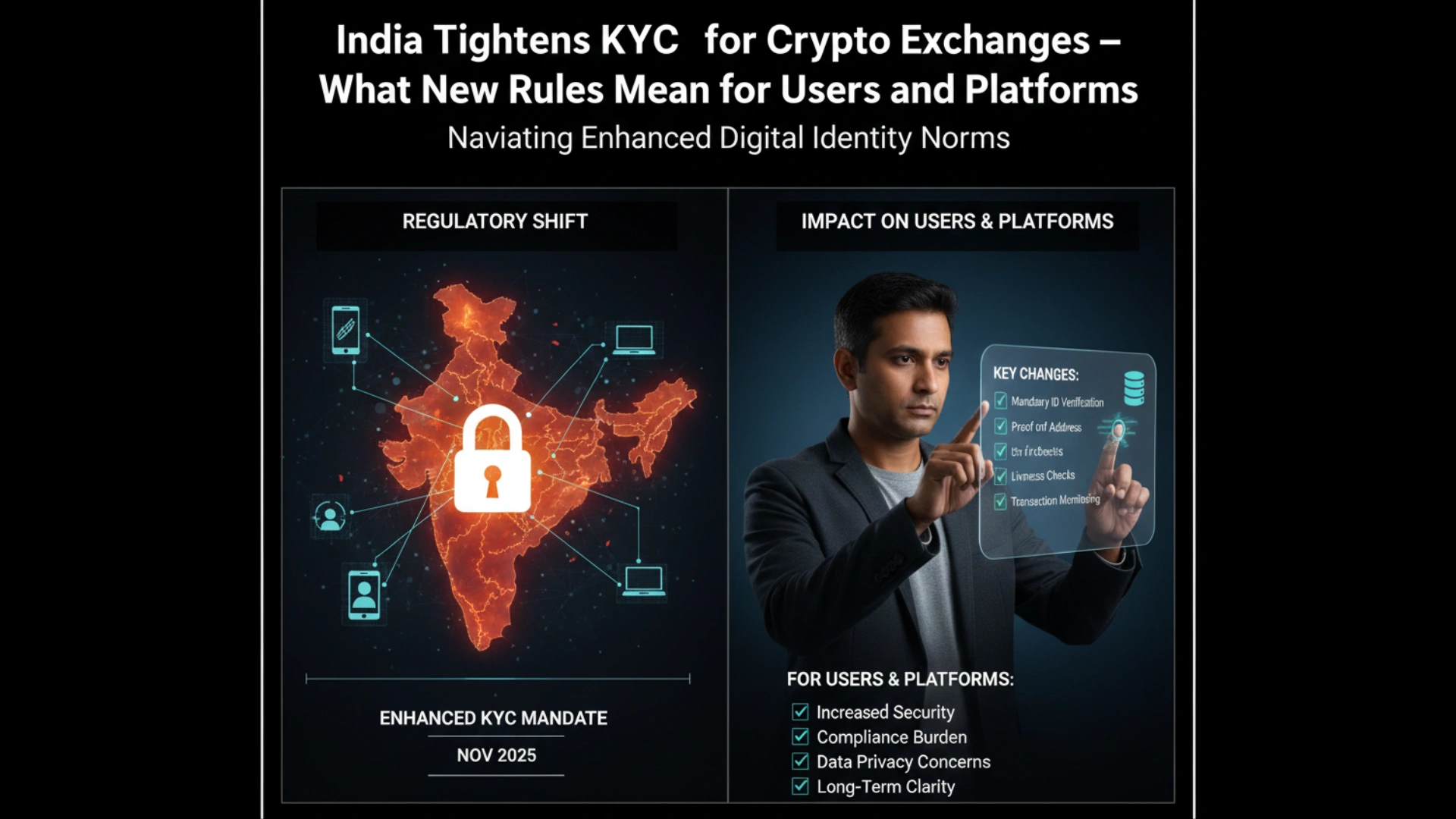A new era of regulation is unfolding for India’s cryptocurrency ecosystem. As crypto adoption rapidly expands from Tier-1 to Tier-3 cities, the Indian government has rolled out strengthened compliance requirements for all crypto exchanges operating in the country.
The 2025 compliance upgrade focuses mainly on:
- Stricter KYC (Know Your Customer) verification
- Enhanced AML (Anti-Money Laundering) checks
- Mandatory reverification for existing users
Why India Has Tightened KYC Regulations for Crypto Exchanges
Crypto trading in India has surged dramatically in the past few years. Millions have signed up on Indian and global exchanges like CoinDCX, WazirX, and Binance. But with rapid growth came issues such as:
- Money laundering risks
- Fraud and scams
- Unverified or fake accounts
- Cross-border anonymous crypto transfers
To counter these risks, the government aims to:
- Strengthen financial stability
- Prevent misuse of digital assets
- Protect investors
- Align India with global crypto standards
- Build trust in regulated crypto transactions
What Crypto Users Need to Know About the New KYC Rules
The new compliance system introduces multiple requirements for all crypto users trading, investing, or holding digital assets on Indian platforms.
1. Mandatory Reverification for All Existing Users
Users who registered before the new rules must update their KYC. This includes:
- Aadhaar verification
- PAN verification
- Biometric or facial recognition
- Updated address proof (if required)
Without reverification, users may face:
- Trading limits
- Withdrawal restrictions
- Temporary or permanent account suspension
2. Video KYC for High-Value Users
For users with large trading volumes, exchanges must conduct:
- Live video KYC
- Liveness detection
- Real-time facial match
- Additional identity verification
3. Stricter Source-of-Funds Verification
Users may be required to submit:
- Income source details
- Occupation information
- Linked bank account proof
- Purpose of high-value transactions
4. More Checks on International Wallet Transfers
Sending crypto to foreign wallets may require:
- Purpose of transfer
- Beneficiary details
- Enhanced KYC documentation
Impact of the New KYC Rules on Crypto Exchanges
Exchanges will face significant increases in compliance responsibilities.
1. KYC Must Be Completed Before Any Activity
Under new rules, users must complete full KYC before:
- Depositing funds
- Withdrawing crypto
- Buying or selling digital assets
2. Centralized KYC Record Storage (CKYC Integration)
Exchanges must integrate with:
- CKYC (Central KYC Registry)
- UIDAI Aadhaar verification
- Government AML monitoring systems
3. Broader Documentation Requirements
Exchanges will need to maintain:
- IP logs
- Device fingerprints
- Wallet addresses
- Transaction timestamps
- Suspicious transaction monitoring reports
4. Mandatory Suspicious Activity Reporting (SAR)
Exchanges must report:
- Unusual trading behavior
- Large withdrawals
- Fraud-linked accounts
- High-value cross-border transfers
5. Penalties for Non-Compliance
Non-compliant platforms may face:
- Heavy fines
- License restrictions
- Operational bans
- Account freezing
- Legal action
Impact of These Rules on the Indian Crypto Market
Short-Term Effects
- Temporary Slowdown: Reverification may reduce trading volume, deposits, and withdrawals.
- Reduction in Fake Accounts: Thousands of inactive or suspicious users may be removed.
- Higher Fees: Exchanges will invest heavily in compliance technology, KYC systems, and AML tools.
Long-Term Expected Outcomes
- Stronger investor protection
- Enhanced trust in Indian exchanges
- Better global alignment for India’s crypto industry
- Reduced fraud and illegal transactions
- More institutional participation






